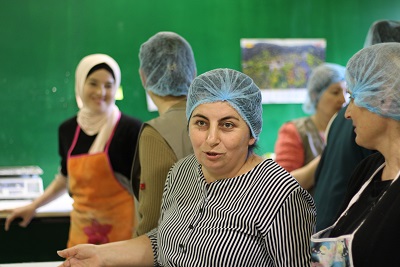From vocational training to employment
Date:
This story has been originally published by UN Women Georgia.
Lela Setouri and Mzia Jabishvili met in November 2019 during their vocational training courses in the culinary arts. Both were from Akhmeta (in eastern Georgia’s Kakheti region), which helped bring them closer together.

At the time, Lela was preparing to open a café in Akhmeta and had already begun renovations, though she wanted to be more involved in the kitchen’s operations and hoped to study the culinary profession herself. “I always wanted to have my own business and source of income. I thought that if I learned cookery, the café would be more successful and provide a higher-quality service. So, when I had the chance to train in this area free of charge from UN Women project, I seized it,” she recalls.
Lela learned about the possibility of a professional course from the Kakheti Regional Development Foundation (KRDF). In partnership with the KRDF, UN Women is implementing the “Women’s Economic Empowerment in the South Caucasus” project, a goal of which is to support women to become employed by providing them with vocational training. Lela and Mzia have received funding for their culinary courses under this project.
The women gained theoretical and practical knowledge during the course and became familiar with both local and international cuisine, as well as with hygiene, catering strategies, food processing and storing methods and, of course, with a wide variety of recipes.

“The practical lessons were very interesting. I learned how to make different kinds of salads and baked goods, and my khachapuri and muffins were especially delicious,” recalls Mzia, who now uses her own culinary knowledge in practice. After graduating, Lela offered her a job in the café. “It was very important for me and my family to take this course,” Mzia says. “The expectation that we would have our own income came true.”
In addition to Mzia, two more women work at Lela’s café. She says she is happy to share with them the knowledge acquired from the course and intends to increase the number of women she employs.
UN Women is implementing the “Women’s Economic Empowerment in the South Caucasus” project in Georgia, Armenia and Azerbaijan with the financial support of the Swiss Agency for Development and Cooperation and the Austrian Development Cooperation. One of the project’s main goals is to ensure that women, particularly the poor and socially excluded, are economically empowered. The project participants are trained, acquire professional skills and become economically capable, which helps them gain employment and self-employment. UN Women’s project partners in Georgia are KRDF, the Taso Foundation and CARE International in the Caucasus.